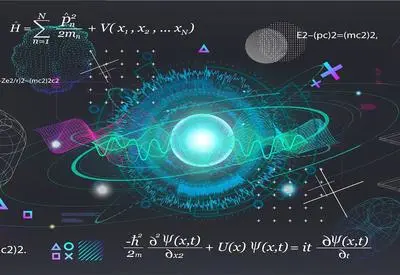The craze with all things quantum is not just because of its inherent weirdness. It’s motivated by a reductionist impulse that has been animating science from Robert Hooke in the 17th century to Stephen Hawking in the 21st. The idea that we can discover the fundamental level of reality might be alluring, but it’s based on a faulty philosophy, not science, writes Peter West.
The idea that reality is reducible to its most fundamental parts still animates much of science, particularly physics and philosophy. The craze with all things quantum is partly animated by this thought: understand quantum mechanics, the way that matter behaves at the smallest level known to us, and you’ve understood everything. But this philosophical impulse - because contrary to belief, it’s not scientific - that the microscopic holds the key to the secrets of the universe, is much older than quantum mechanics. It goes back at least all the way to the 17th century and the invention of the microscope. Some of the best critiques of reductionism also date from the same century: Size doesn’t matter, the very small is just one realm of reality among many, with no special privilege.
In 1665, three years after the end of the English Civil War and a year before the Great Fire of London, a book called Micrographia was published. The author was Robert Hooke, a founding member of the Royal Society (itself founded in 1660), and the full title of the text was Micrographia: or Some Physiological Descriptions of Minute Bodies made by Magnifying Glasses with Observations and Inquiries thereupon. Hooke was at the cutting edge of ‘experimental philosophy’; a movement that set the stage for modern science as we now know it, and which took inspiration from the empirical philosophies of figures like Francis Bacon and Aristotle, as opposed to the kind of a priori, ‘armchair’ reasoning about nature endorsed by the likes of René Descartes, Baruch Spinoza, and Plato.
 SUGGESTED READING
What the Nobel prize gets wrong about quantum mechanics
By
SUGGESTED READING
What the Nobel prize gets wrong about quantum mechanics
By
Hooke’s aims were simple: show to the world, through illustrations and accompanying passages of text, what ordinary objects like poppy seeds, drawing pins, and various insects look like through a microscope. According to Hooke, microscopes, like telescopes, put us on the cusp of doing what philosophers from Antiquity onwards had always tried to do, namely, understand the fundamental nature of reality. In fact, the invention of the microscope was all part of God’s plan for us. Finally, we had reached the point where, thanks to the ingenuity and intellect bestowed upon us by the Creator, we could enhance and augment our own sensory organs. Microscopes played their part in this by allowing us to improve our insight exponentially and thereby, in principle, see what the world is really like.
___
Have 21st century scientists and philosophers really moved beyond the idea that with the right scientific equipment we can ‘discover’ what the world around us is really like?
___
Even today, Micrographia is an amazing text. Despite his scientific aims, there’s something alluringly imaginative about Hooke’s drawings (they are reminiscent of early attempts to visualise dinosaurs based on fossil findings such as the (in)famous dinosaur sculptures in Crystal Palace Park in London). It was also a hugely significant text. Its aims and impact may seem modest now, after all, we have a good idea (or at least think we do) of what very small objects really look like. We grow up learning that even atoms are composed of smaller entities like a nucleus, electrons, protons, and neutrons.





















Join the conversation